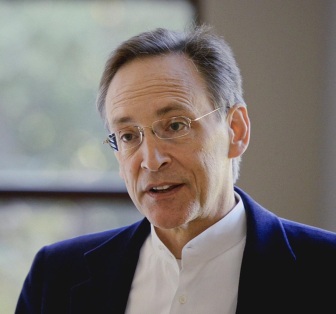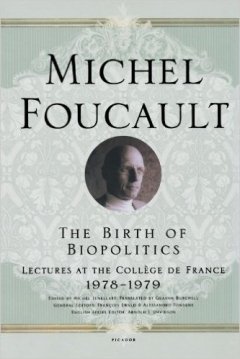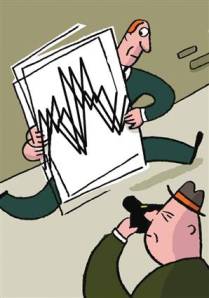
In the end of November, as it is the case every year since 2004, Oxford Dictionaries revealed their choice for the word of the year. For 2016, they settled on “post-truth”. This adjective, defined as “relating to or denoting circumstances in which objective facts are less influential in shaping public opinion than appeals to emotion and personal belief”, echoed a number of events of the past few months, including UK’s vote in favor of Brexit and, most infamously, the election of Donald J. Trump. Following the announcement, a few commenters were quick to observe that “post-truth” could be considered as an emanation of postmodernism, the brain-child of post-1968 French philosophy and critical theory. Whether you buy this or not – I don’t -, there’s no denying that “post-truth” has been everywhere in the press and on social networks. Yet, as a historian of science with little – if any – interest in questions of “truthfulness” and “falsity”, I would like to suggest another ten-letter word for describing more accurately what has been going on over the past few months – and, admittedly, over the past few decades as well, 2016 representing in my opinion some kind of turning point in its development. This word is: “agnotology”.
For those of you who are not familiar with the concept elaborated by Robert N. Proctor in books such as The Cancer Wars: How Politics Shapes What We Know and Don’t Know About Cancer (1995) and Golden Holocaust – Origins of the Cigarette Catastrophe and the Case for Abolition (2012), suffice to say that “agnotology” is the production and dissemination of ignorance – as well as the study of this phenomenon. Proctor’s argument in a nutshell is that knowledge is not created out of a vacuum which we would call “ignorance” but, instead, that both knowledge and ignorance are social constructs, therefore contingent to many social, political and individual factors. The production and dissemination of ignorance, therefore, can be studied using the tools that are traditionally attached to the history of science, making the distinction between science and non-science not so significant in the process. When we look at the history of how the cigarette industry intentionally spread doubts about evidences that linked smoke ingestion to cancer, there were a few scientists to back this claim. At first, I was skeptical about “agnotology” because I had read Naomi Oreskes and Erik Conway’s Merchants of Doubt, which does not use the term “agnotology” but tells a relatively similar story of ignorance dissemination, and was unsatisfied with the way they tried to demarcate between the good, disinterested scientists fighting for truth and those who were paid by big corporations to spread false information – I had expressed my dissatisfaction on the INET version of this blog. However, I do not find the same problem with Proctor’s historical narrative which is not so much interested in questions of demarcation but rather in the cultural and political context in which ignorance is produced and disseminated. Accordingly, agnotology has been used in the history of economics by Phil Mirowski and Edward Nik-Khah in a way that may seem controversial at first but which I found, after some resistance, increasingly convincing. After all, agnotology deals with producing and distributing something, so economics should not be too far away when we think about it. Two French economists have recently tried to use Proctor’s work, without using the term ‘agnotology’, in order to build a case against the critics of mainstream economics but in my opinion – which I have expressed in a forthcoming review of their book for a French STS journal -, they fell short of understanding the complexity of the concept and, quite ironically, ended up generating a lot of agnotology over the current status of their discipline.

But so much for these issues of scientific demarcation – or lack therof. “Agnotology” is an enlightening word to describe 2016 because it is effectively applicable to the political issues of the day. Ignorance production and dissemination is not something which is just relevant to scientific issues. It is actually, a total social fact in the Maussian sense of the term, one that ties together cultural, psychological and political elements. With the election of Donald Trump, I even wonder if it is not possible to assert that we are entering an age of agnotologic governmentality, a way of governing that uses ignorance as a political device. In using the term governmentality, I explicitly refer to Foucault’s Birth of Biopolitics. Governmentality, in Foucault’s conception, should not be confused with “government”. A regime of governmentality is enforced, not just by the State, but at many different levels where knowledge and power are connected. Suffice to replace knowledge by ignorance and then you have some idea of what a Foucaldian version of agnotology could look like. Since his election in November, Donald Trump has been a master in disseminating so much information, both in the press and on social networks, that it is almost impossible to assess what his legislature will yield. But of course, this had not begun with his election: this is the way he had behaved since the very beginning of his campaign at the Republican primaries. At the time, it had been summed up in one fantastically short tweet.
Donald Trump is like if the comments section were a person.
— lafix (@lafix) February 27, 2015
Now that “the comments section” has become the new President of the United States, we can argue that the kind of ignorance that such comments section typify will not only lead the most powerful nation, but as a result will preside over the way of the world at large. But ignorance is not a “top-down” phenomenon and that’s what makes it so stealth, yet powerful. Ignorance is cultivated at every level of the society and now, through more or less trustable internet news coverage, it is disseminated at a higher speed. Even academics and self-proclaimed “intelligent” people such as you and I can be subjected to it. If you have been a regular user of social networks in the course of the past few months, I defy you to tell me that you have never fallen into a clic-bait, believing for at least a few minutes a piece of information that has been revealed to be either false or (mis)guided by a non-objective source. The bombing of Aleppo, for instance, has been the subject of so much news coverage that it is impossible be sure that everything we were told was true. While there is no doubt that, on one hand, some information has been manipulated by pro-Syrian and Russian medias, we are not so naive as to believe that there is no propaganda on the other side, too. Increasingly complex conflicts and social issues such as this one are not easy to grasp and we can all be deceived. Effective propaganda knows how to exploit the capacity we all have to doubt. It is no surprise that agnotology is often related to neoliberalism. It is not so much, I think, that there is a mechanical relation between the two but, instead, that both are so squeezed in the recesses of our our everyday life that they are difficult to espace, unless we turn off our computers and start leading a more recluse life – which may not be a bad idea after all.
Anyway, I am afraid I have conveyed that 2016 has been a very bad year and this is similar to a lot of rants you have already read elsewhere. I should apologize for my lack of originality. But there is also a more positive message: as historians of science, we may be able to apply our critical toolbox to the understanding of how we got there and, hopefully, how we will be able to get away with it.

 At the latest
At the latest  t still, at the very least, mistaken. For at least one part of the argument is true: economists, on the whole, are not interested in the history of their field and are not likely to be interested in it anytime soon. A bibliographic research I have undertaken over the past few years with my friend and fellow Pedro Duarte – forthcoming in the
t still, at the very least, mistaken. For at least one part of the argument is true: economists, on the whole, are not interested in the history of their field and are not likely to be interested in it anytime soon. A bibliographic research I have undertaken over the past few years with my friend and fellow Pedro Duarte – forthcoming in the  On the other hand, sociologists, historians, political scientists, and even management scholars are increasingly drawn to the history of recent economics. They do so because they feel that economics is an important part of today’s social, political and cultural environment and they want to understand it. Of course, there’s nothing new about this. Another friend and colleague of mine, Loïc Charles, has done work on 18th century economics with practicing historians, showing how economic thinking was intertwined with a lot of things happening at the time: international trade (including, most notoriously, slave trade), the colonization of the Americas, the French revolution, etc. But what is specific to the recent – postwar – period, is that economic thinking is not just mixed with other types of knowledge and practices, but increasingly, is THE knowledge which is used as a way to ground, to legitimize all knowledge and practices. This recent move toward the economization of every aspect of our society is what researchers have come to designate as “neoliberalism”, and this is the one of the main concepts that makes the study of postwar economics a possibly interdisciplinary venture, one that has a lot of chance to attract readers and create scholarship.
On the other hand, sociologists, historians, political scientists, and even management scholars are increasingly drawn to the history of recent economics. They do so because they feel that economics is an important part of today’s social, political and cultural environment and they want to understand it. Of course, there’s nothing new about this. Another friend and colleague of mine, Loïc Charles, has done work on 18th century economics with practicing historians, showing how economic thinking was intertwined with a lot of things happening at the time: international trade (including, most notoriously, slave trade), the colonization of the Americas, the French revolution, etc. But what is specific to the recent – postwar – period, is that economic thinking is not just mixed with other types of knowledge and practices, but increasingly, is THE knowledge which is used as a way to ground, to legitimize all knowledge and practices. This recent move toward the economization of every aspect of our society is what researchers have come to designate as “neoliberalism”, and this is the one of the main concepts that makes the study of postwar economics a possibly interdisciplinary venture, one that has a lot of chance to attract readers and create scholarship. So, is it convincing? Well, let’s take for instance Béatrice’s
So, is it convincing? Well, let’s take for instance Béatrice’s 
 The beginning of a new year is always the occasion to reflect on the recent past, as the posts of my fellows
The beginning of a new year is always the occasion to reflect on the recent past, as the posts of my fellows 
 my surprise to read this in one of their latest columns:
my surprise to read this in one of their latest columns: Thanks to some friends journalists, I got an invitation for a press projection of
Thanks to some friends journalists, I got an invitation for a press projection of  The author was
The author was 
 You can call it scandalous; you can call it Mickey Mouse; you can even call it fried chicken, if you want. But the session titled “From History of Economics to Histories about Economics” at the
You can call it scandalous; you can call it Mickey Mouse; you can even call it fried chicken, if you want. But the session titled “From History of Economics to Histories about Economics” at the  Regrettably I am too slow. My speed impairment is expressed in my street running, my pool swimming, my football striker instincts and my paper writing. Worse still, I don’t usually win games: chess, checkers, Go, Unreal Tournament, Fifa 07. Picking
Regrettably I am too slow. My speed impairment is expressed in my street running, my pool swimming, my football striker instincts and my paper writing. Worse still, I don’t usually win games: chess, checkers, Go, Unreal Tournament, Fifa 07. Picking  Businessmen are steely figures. They hire and fire. They invest and disinvest. They make decisions in the haze of uncertainty. And for all that they calculate, reason, plan.
Businessmen are steely figures. They hire and fire. They invest and disinvest. They make decisions in the haze of uncertainty. And for all that they calculate, reason, plan.